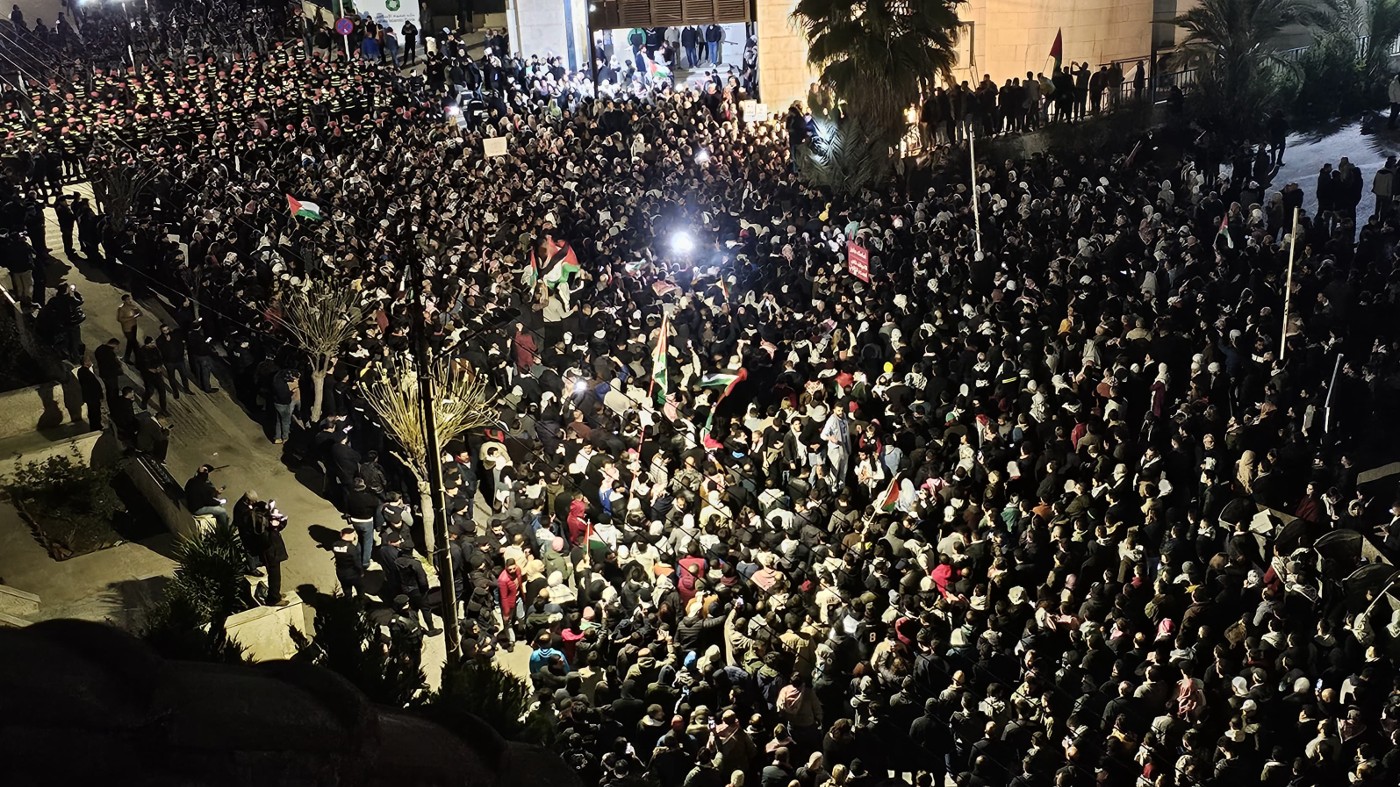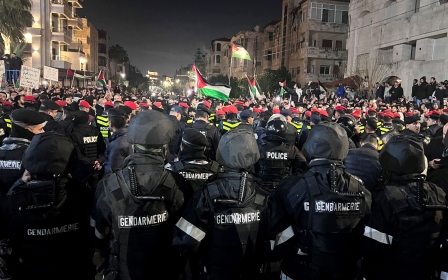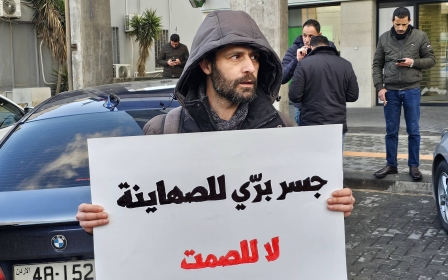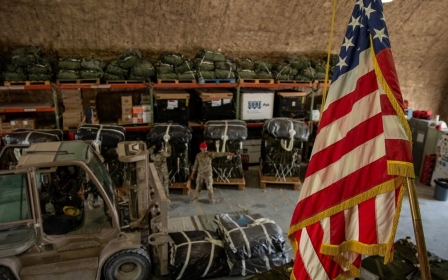Jordan: Thousands of protesters surround Israeli embassy for fourth consecutive day
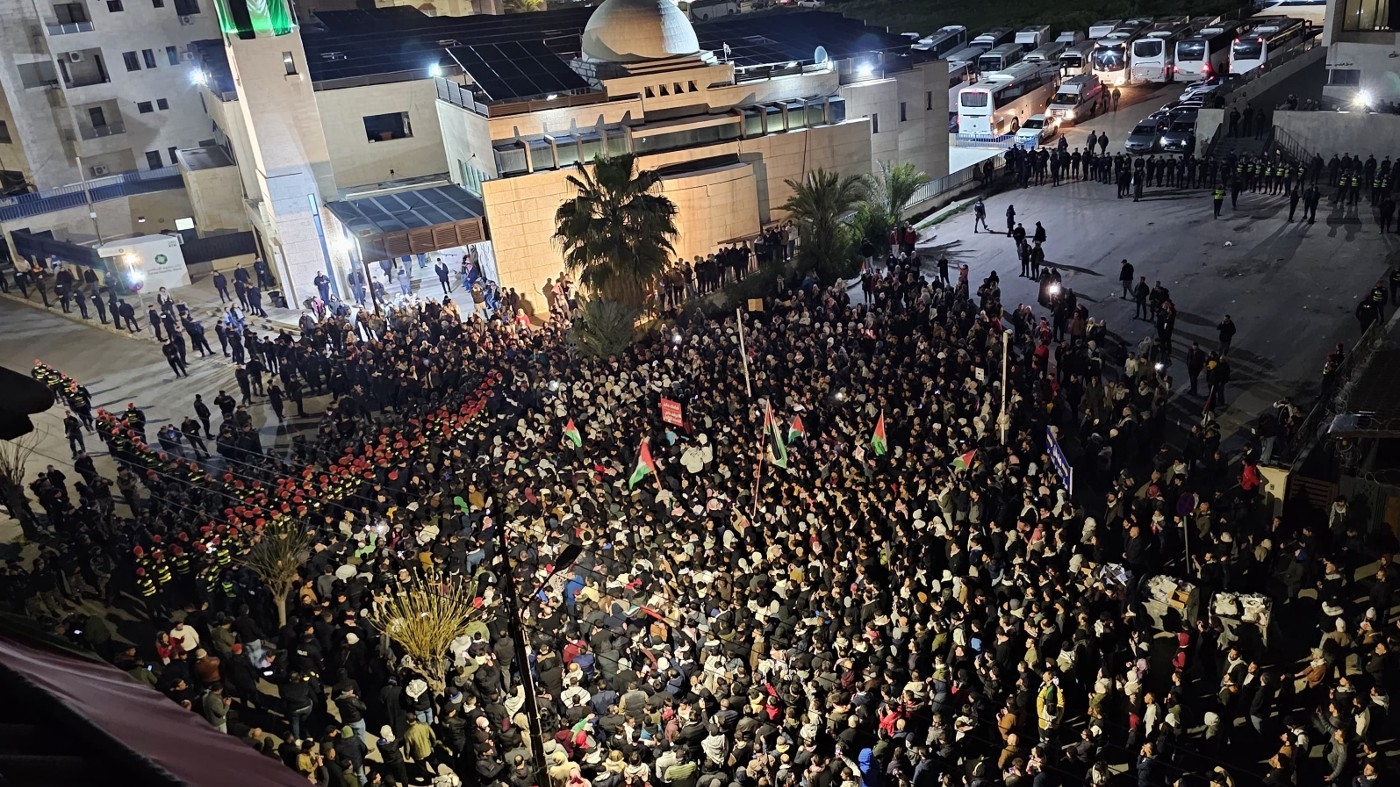
Mohammed al-Abssi is one of thousands of Jordanians who have been surrounding the Israeli embassy in Amman for the last four days.
He is clear about their intentions. “Our protests will continue until the war on Gaza comes to an end,” he told Middle East Eye. “The protests are expanding to other cities and governorates. We will call for demonstrations in multiple locations.”
Yesterday marked the fourth consecutive day that thousands of protesters have come out on to the streets of the Jordanian capital to surround the Israeli embassy, demanding its closure. Young demonstrators tried to breach the security cordon established around the complex by Jordanian security forces, resulting in the arrest of approximately 200 protesters.
While the embassy is currently without a diplomatic mission, after Israel’s ambassador left Amman in October and Jordan recalled its ambassador in November in protest at the ongoing war in Gaza, al-Abssi said that protesters “have heard that the embassy has partially resumed operations”.
Jordanian security forces and gendarmerie have forcefully prevented protesters from reaching the embassy compound in the Rabia neighbourhood of Amman. Demonstrators have gathered in the vicinity of the square next to Kalouti Mosque, approximately two kilometres from the embassy, and other areas close by.
New MEE newsletter: Jerusalem Dispatch
Sign up to get the latest insights and analysis on Israel-Palestine, alongside Turkey Unpacked and other MEE newsletters
Protests have escalated significantly since the onset of Israel's war on Gaza. The National Forum for Supporting Resistance, a coalition of political parties and activists, has been one of the organisers.
Al-Abssi, a participant in the protests and a member of the Ataharrak movement against normalisation with Israel, said the siege of the embassy is part of a series of Jordanian protests that have not ceased since 7 October.
“The siege of the embassy has intensified in response to the blockade of the Shifa complex and al-Aqsa Mosque,” he said.
Israeli forces have been attacking and laying siege to the medical complex since 18 March, and have severely restricted Palestinian worshippers' access to the Jerusalem holy site.
“Our demands include the complete closure of the Israeli embassy. We have heard that the embassy has partially resumed operations. Additionally, we call for the cessation of the land bridge,” al-Abssi said, referencing claims - denied by the Jordanian government - that Arab Gulf countries are circumventing the Houthi blockade on Israeli ships by trucking products to Israel via Jordan.
“Israel targets Jordan just as it targets Palestine. The danger is one, and the Jordanian community recognises this,” al-Abssi told MEE.
'Our demands include the complete closure of the Israeli embassy. We have heard that the embassy has partially resumed operations'
- Mohammed al-Abssi, a participant in the protests
The protesters, estimated to number around 10,000, condemned the genocide against Palestinians, chanting: “O cowardly Arab governments! On behalf of the voiceless, we shout against the land bridge. The land bridge is a betrayal. We, too, stand with Gaza. We are besieged.
"Let the voice rise from Amman. We are part of the flood. Let every traitor and collaborator hear it. With Hamas for liberation.”
Young protesters who spoke with MEE demanded the Jordanian government “stop normalisation with Israel, cancel the Wadi Araba and gas treaties, stop the land bridge that transports goods from Gulf countries towards Israel, and prevent the export of Jordanian vegetables” to Israel.
The Jordan-Israel peace treaty of 1994, signed at the southern border crossing of Wadi Araba, is still deeply unpopular in Jordan. Jordanian protesters have previously denounced the kingdom’s import of Israeli gas as “treasonous”.
Protests resonate in Gaza
Khaled al-Juhani, a member of the National Forum Supporting Resistance, said that even though the Israeli embassy was closed, “this movement still sees it as a symbol of normalisation despite the ongoing genocide. The Jordanian people categorically reject normalisation and embrace resistance as an option”
“Today, it is the duty of the Jordanian authorities to begin thinking and acting in a manner that aligns with the aspirations of its people and reconciles with their will,” al-Juhani told MEE.
This, he said, meant halting the land bridge and “immediately stopping the export of vegetables to the occupation. In return, efforts should be made to establish a humanitarian land bridge to northern Gaza, in cooperation with international bodies”.
During protests, security forces arrested several young people who attempted to reach the Israeli embassy. Tear gas canisters were fired to disperse them. According to lawyer Abdul Qader al-Khatib, the number of detainees reached 200.
“Although security agencies released a large number of protesters, the administrative governor re-arrested some of them despite their release by the judiciary,” al-Khatib said. Himam, a civil society alliance, has rejected the detention of protesters and called on the Jordanian government to ensure that security personnel adhere to a code of conduct.
The Jordanian protests have resonated in Gaza, with human rights activist Maysara Malas sharing tweets from Palestinians welcoming them.
“To those sitting at home and not participating in constitutional peaceful activities to support Gaza, claiming that they do not benefit Gaza in any way - this is the heroic response of the people of Gaza to their claims,” Malas said on social media.
Middle East Eye delivers independent and unrivalled coverage and analysis of the Middle East, North Africa and beyond. To learn more about republishing this content and the associated fees, please fill out this form. More about MEE can be found here.


